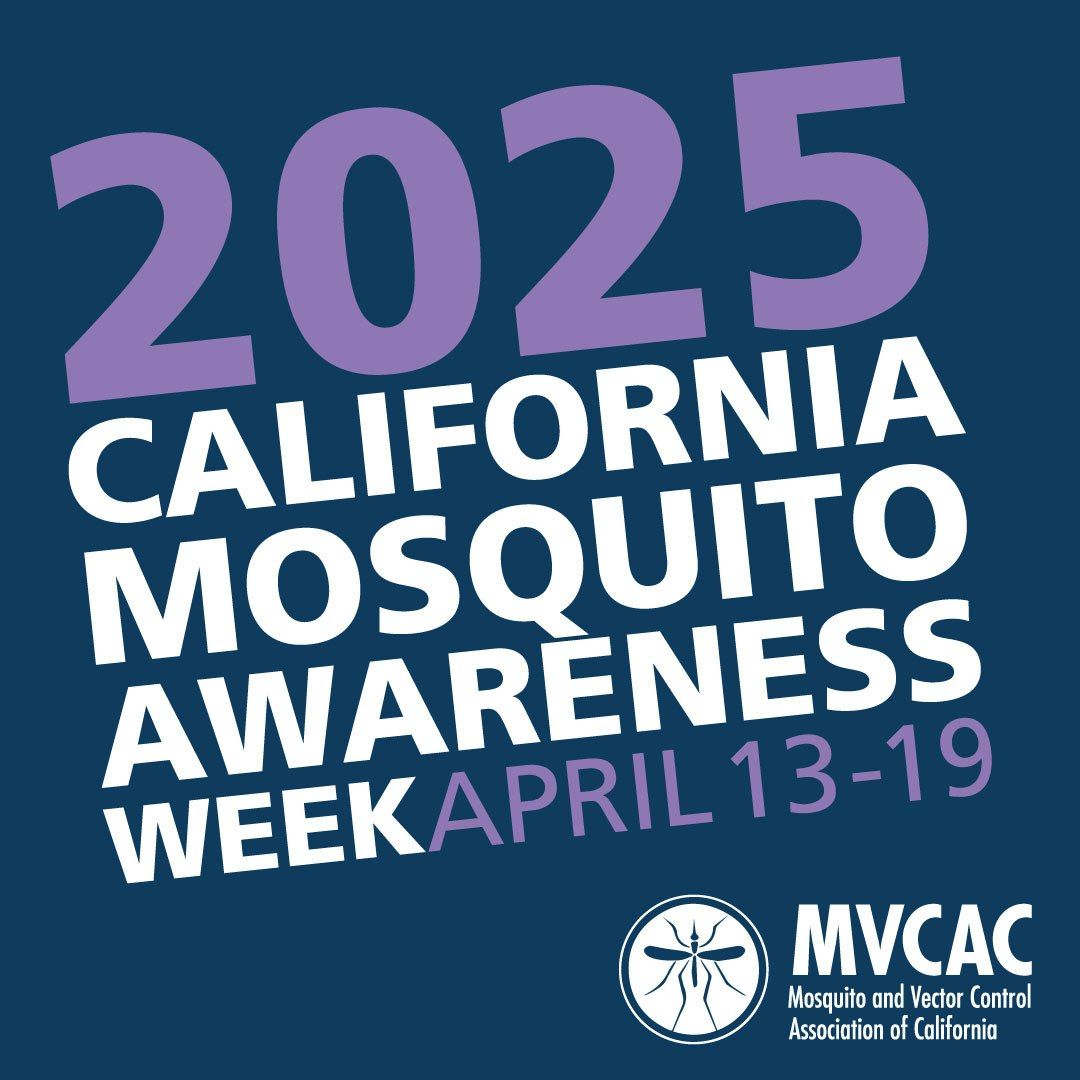Mosquito Awareness Week

Mosquito Awareness Week, observed April 13 -19, 2025, educates California residents about mosquitoes and how to help prevent the spread of mosquito-transmitted diseases
Mosquito experts are encouraging residents to take precautions, both at home and when traveling, to protect themselves from mosquito bites and the diseases they can spread. In addition to West Nile virus, which is always present in our state, cases of locally transmitted dengue have been reported in California. In 2024, there was a record number of returning travelers diagnosed with dengue, which led to 18 reported locally acquired dengue infections in California. This year, that number could increase as the dengue outbreak continues in Latin America.
Dengue is transmitted by invasive Aedes mosquitoes, and this species of mosquitoes continues to spread rapidly throughout the state. Currently, invasive mosquitoes have become established in 24 counties in California. Invasive Aedes are very hard to control and pose a serious public health threat because they can spread diseases such as dengue, Zika, and chikungunya to people, as well as animal heartworm to pets.
“With locally acquired dengue now a reality in our state, we are doing everything we can to limit the spread of the disease,” said Stephen Abshier, president of the Mosquito and Vector Control Association of California. “There are simple steps Californians can take to help eliminate mosquitoes and protect themselves, such as dumping and draining standing water in and around their homes. As the weather warms up and residents enjoy time outside, it’s important to wear an EPA-registered repellent both at home and when traveling.”
The CDC recommends using an EPA-registered repellent to prevent mosquito bites not only while traveling to an area with dengue, chikungunya, or Zika, but also for three weeks after returning home. This helps ensure these viruses don’t spread to mosquitoes in other communities.
West Nile virus, spread by Culex mosquitoes, is the most prevalent and serious disease transmitted by mosquitoes in California. There is no human vaccine for West Nile virus, a disease that can cause debilitating cases of meningitis, encephalitis, and even death. Our state had very high West Nile virus activity in 2023 (433 human cases, 20 of which were fatal). Fortunately, there were fewer cases in 2024 (129 human cases, 12 of which were fatal). There have been more than 8,000 human cases and nearly 400 deaths reported in California since 2003 when West Nile virus first appeared in our state.
“Mosquito Awareness Week recognizes the important work mosquito and vector control agencies do to protect public health and highlights the importance of partnerships between public agencies, local communities, and the state in combating mosquito-transmitted diseases," said State Senator Dr.
Aisha Wahab, who authored the state resolution (SCR 49) recognizing California Mosquito Awareness Week. “These agencies are some of the most important organizations that actually save lives and prevent the spread of diseases. Public awareness and participation are also key to reducing mosquitoes and helping to keep our communities safe.”
This year, mosquito experts in Southern California are working to prevent a spike in mosquito numbers as a result of the destruction to properties caused by the recent wildfires. Unmaintained swimming pools and other stagnant water sources in Altadena and Pacific Palisades can lead to the development of millions of mosquitoes. Residents impacted by the Eaton Fire are encouraged to contact the San Gabriel Valley Mosquito and Vector Control District for more information and assistance with mosquito inspections and control and residents impacted by the Palisades Fire can contact the Los Angeles County West Vector Control District.
Everyone can do their part to protect themselves from mosquito bites and spring is the perfect time to eliminate mosquitoes from your home and yard:
● Install screens on windows and doors and keep them in good repair to keep mosquitoes out of your home.
● Eliminate all sources of standing water on your property, including in flowerpots, old tires, buckets, pet dishes, and trash cans. Mosquitoes lay their eggs in very small amounts of standing water.
● Repair leaking faucets and broken sprinklers that can contribute to standing water around your home.
● Clean rain gutters clogged with leaves.
● Apply insect repellent containing an EPA-registered active ingredient, including DEET, picaridin, oil of lemon eucalyptus, or IR3535, to clothes and exposed skin according to label instructions. Repellents keep mosquitoes from biting. It is important to follow product label instructions for the safe use of repellents on children and apply repellent after putting on sunscreen.
● Dress in long sleeves and pants, especially if outside at dawn and dusk when mosquitoes that can spread West Nile virus are most active.
● Report neglected swimming pools and day-biting mosquitoes to your local mosquito and vector control agency (agency information can be found at www.mvcac.org)
To learn more, please visit the MVCAC website or the California Department of Public Health Mosquitoes and Mosquito-Borne Diseases webpage.
About MVCAC
The Mosquito and Vector Control Association of California (MVCAC) is the statewide voice for mosquito and vector control professionals. The association provides public health information, expertise, mosquito and vector-borne disease surveillance, innovative research, professional training, effective legislative and regulatory advocacy on behalf of California public agencies.
MVCAC Mosquito Awareness Week Press Release